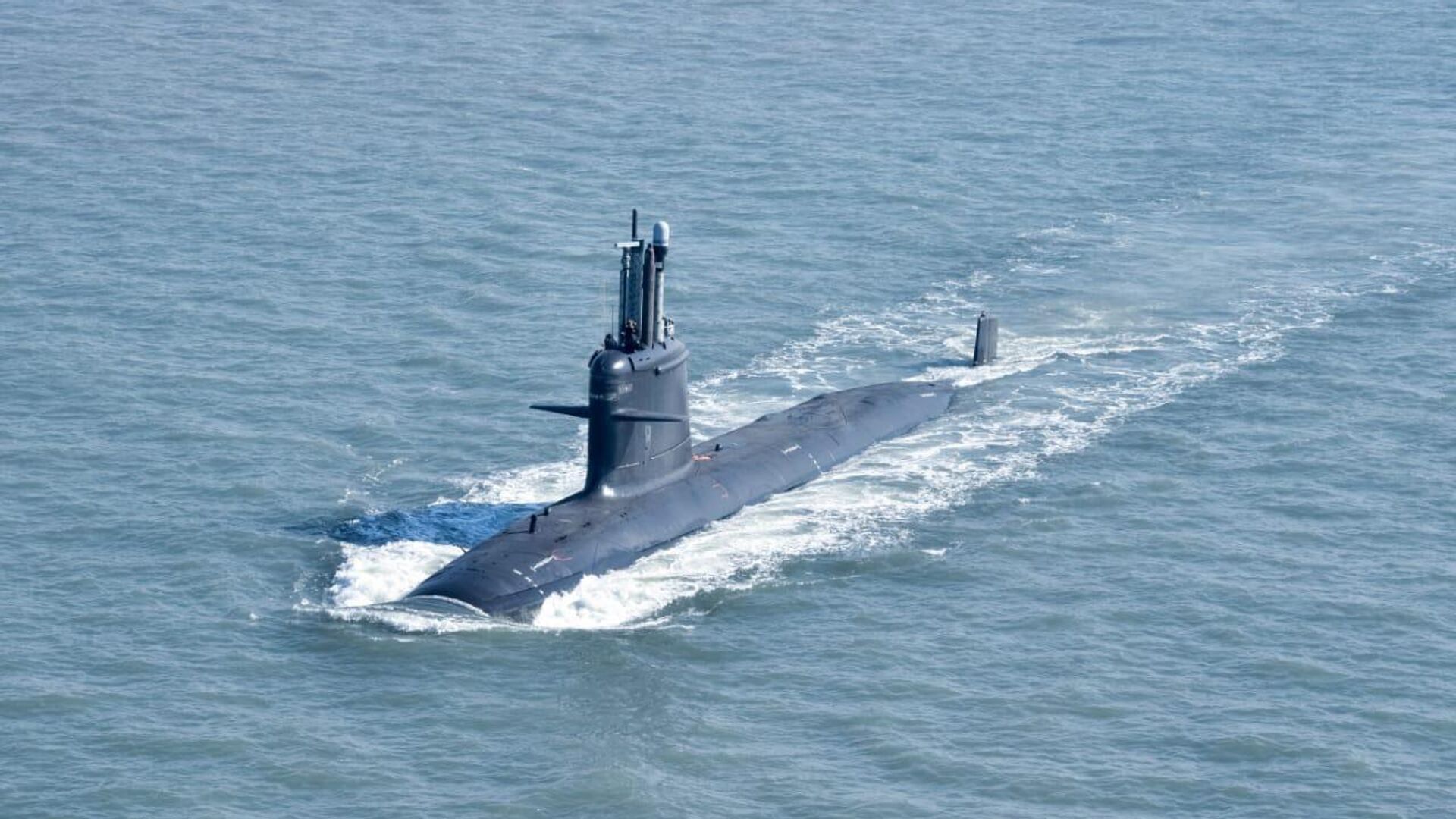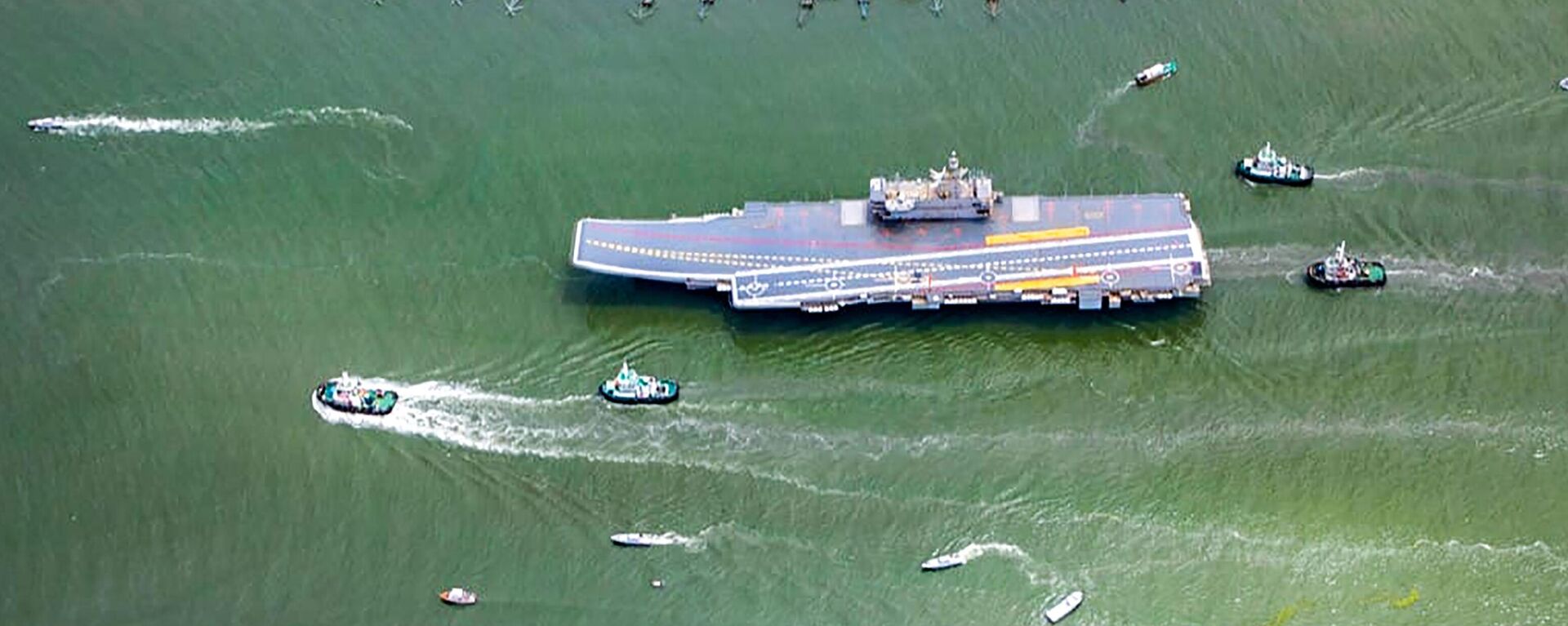https://sputniknews.in/20240912/unmanned-underwater-vessels-indian-navys-game-changers-8140464.html
Unmanned Underwater Vessels: Indian Navy's Game-Changers
Unmanned Underwater Vessels: Indian Navy's Game-Changers
Sputnik India
The 100-tonne unmanned underwater vessels being developed for the Indian Navy will become multi-dimensional game-changers for the country's blue water force amid the global thrust on such military platforms, a retired military officer has said.
2024-09-12T20:19+0530
2024-09-12T20:19+0530
2024-09-12T20:37+0530
sputnik opinion
indian navy
ministry of defence (mod)
unmanned aerial vehicles (uavs)
indian ocean
military equipment
military spending
drdo
defense sector
arabian sea
https://cdn1.img.sputniknews.in/img/07e7/06/13/2556009_0:67:1280:787_1920x0_80_0_0_ddcf6b5fd2f4fe3a6f5186d7a280f5dd.jpg
The 100-tonne unmanned underwater vessels being developed for the Indian Navy will become multi-dimensional game-changers for the country's blue water force amid the global thrust on such military platforms, a retired military officer has said.According to Indian Navy veteran, Commodore (Retd) Seshadri Vasan, these unmanned underwater vessels will meet the futuristic requirements of the country's maritime force.He believes that the Navy has obviously been monitoring the developments elsewhere on the planet, especially in the Ukraine conflict.He reckons that the biggest advantage of unmanned underwater vessels is that they are highly cost-effective. For instance, the cost of an unmanned underwater vessel is expected to be around INR 25 crore ($3 million). Simply put, this amount is not much when one compares the cost of a conventional submarine or a warship.Also, there is no human involvement except for guiding them. Some of them would even function autonomously with the modern capability of Artificial Intelligence (AI).The defence expert emphasised that the prime factor behind the push for unmanned vehicles in defence is the risk of human losses.On the contrary, in the case of unmanned operations, the fear of loss of human life is not there, which will always be a great factor for deployment in extremely dangerous areas, including where a conventional submarine or even a modern ship cannot operate because of depth constraints or because of enemy firepower, he noted.The think tanker suggested that that's why it offers the Indian Navy a phenomenal amount of advantage in carrying out sophisticated warfare. More so, in areas of importance that are far away from the Indian shores.Basically, it is all about allowing an independent vessel that is underwater to carry out a variety of missions, from a covert operation to espionage in enemy territory amongst others, the strategic affairs commentator remarked.He opined that unlike conventional submarines, which are bigger and could be detected by the adversary's sonars, tracking much smaller vessels under the sea would be far more difficult.In a nutshell, these unmanned underwater vessels will provide the nation's naval establishment to establish sea control, and supremacy in areas where it wants to exert its influence and power without risking human lives, he concluded.
https://sputniknews.in/20240808/whats-behind-navys-pursuit-of-more-aircraft-carriers-7985436.html
indian ocean
arabian sea
bay of bengal
Sputnik India
feedback.hindi@sputniknews.com
+74956456601
MIA „Rossiya Segodnya“
2024
Pawan Atri
https://cdn1.img.sputniknews.in/img/07e6/0c/13/139630_147:0:831:684_100x100_80_0_0_8fa2b25903e7787fe6a2698552c167df.png
Pawan Atri
https://cdn1.img.sputniknews.in/img/07e6/0c/13/139630_147:0:831:684_100x100_80_0_0_8fa2b25903e7787fe6a2698552c167df.png
News
en_IN
Sputnik India
feedback.hindi@sputniknews.com
+74956456601
MIA „Rossiya Segodnya“
Sputnik India
feedback.hindi@sputniknews.com
+74956456601
MIA „Rossiya Segodnya“
Pawan Atri
https://cdn1.img.sputniknews.in/img/07e6/0c/13/139630_147:0:831:684_100x100_80_0_0_8fa2b25903e7787fe6a2698552c167df.png
unmanned underwater vessels, unmanned underwater vessels india, unmanned underwater vessels indian navy, unmanned underwater vessels indian defence ministry, unmanned underwater vessels ministry of defence india, unmanned underwater vessels indian naval force, unmanned underwater vessels navy india, unmanned underwater vessels drdo, drdo unmanned underwater vessels, unmanned underwater vessels india news,
unmanned underwater vessels, unmanned underwater vessels india, unmanned underwater vessels indian navy, unmanned underwater vessels indian defence ministry, unmanned underwater vessels ministry of defence india, unmanned underwater vessels indian naval force, unmanned underwater vessels navy india, unmanned underwater vessels drdo, drdo unmanned underwater vessels, unmanned underwater vessels india news,
Unmanned Underwater Vessels: Indian Navy's Game-Changers
20:19 12.09.2024 (Updated: 20:37 12.09.2024) The Ministry of Defence (MoD) has reportedly given the go-ahead to build 100 Extra Large Unmanned Underwater Vessels for the Indian Navy.
The 100-tonne unmanned underwater vessels being developed for the Indian Navy will become multi-dimensional game-changers for the country's blue water force amid the global thrust on such military platforms, a retired military officer has said.
According to Indian Navy veteran,
Commodore (Retd) Seshadri Vasan, these unmanned underwater vessels will meet the futuristic r
equirements of the country's maritime force.
He believes that the Navy has obviously been monitoring the developments elsewhere on the planet, especially in the Ukraine conflict.
He reckons that the biggest advantage of unmanned underwater vessels is that they are highly cost-effective. For instance, the cost of an unmanned underwater vessel is expected to be around INR 25 crore ($3 million). Simply put, this amount is not much when one compares the cost of a conventional submarine or a warship.
Also, there is no human involvement except for guiding them. Some of them would even function autonomously with the modern capability of Artificial Intelligence (AI).
The defence expert emphasised that the prime factor
behind the push for unmanned vehicles in defence is the risk of human losses.
"Just to illustrate, sinking an aircraft carrier will not only be a monumental blow to a naval force, given the billions of dollars spent on building the warship, but in all likelihood, it will also result in a large number of deaths of personnel," Vasan, who's currently the Director of the Chennai-based think tank Centre for China Studies (C3S), added.
On the contrary, in the case of unmanned operations, the fear of loss of human life is not there, which will always be a great factor for deployment in extremely dangerous areas, including where a conventional submarine or even a modern ship cannot operate because of depth constraints or because of enemy firepower, he noted.
The think tanker suggested that that's why it offers the Indian Navy a phenomenal amount of advantage in carrying out sophisticated warfare. More so, in
areas of importance that are far away from the Indian shores.
"For example, if the Indian Navy is looking at conducting an operation in the South China Sea, these underwater vessels could be launched from a distance from any of the platforms, including merchant navy ships or research vessels, thus augmenting the larger plans of the Navy to achieve maritime superiority over hostile states," Vasan underlined.
Basically, it is all about allowing an independent vessel that is underwater to carry out a variety of missions, from a covert operation to espionage in enemy territory amongst others, the strategic affairs commentator remarked.
He opined that unlike conventional submarines, which are bigger and could be detected by the adversary's sonars, tracking much smaller vessels under the sea would be far more difficult.
"Furthermore, if these underwater vessels are equipped with AI and sophisticated smart weapons, such as torpedoes, mines, or missiles for surface ships, it further complicates matters for the adversary. Hence, I believe this is a pathbreaking initiative by the Government of India along with the Navy to arm the country's naval force for future wars," Vasan asserted.
In a nutshell, these unmanned underwater vessels will provide the nation's naval establishment to establish sea control, and supremacy in areas where it
wants to exert its influence and power without risking human lives, he concluded.



